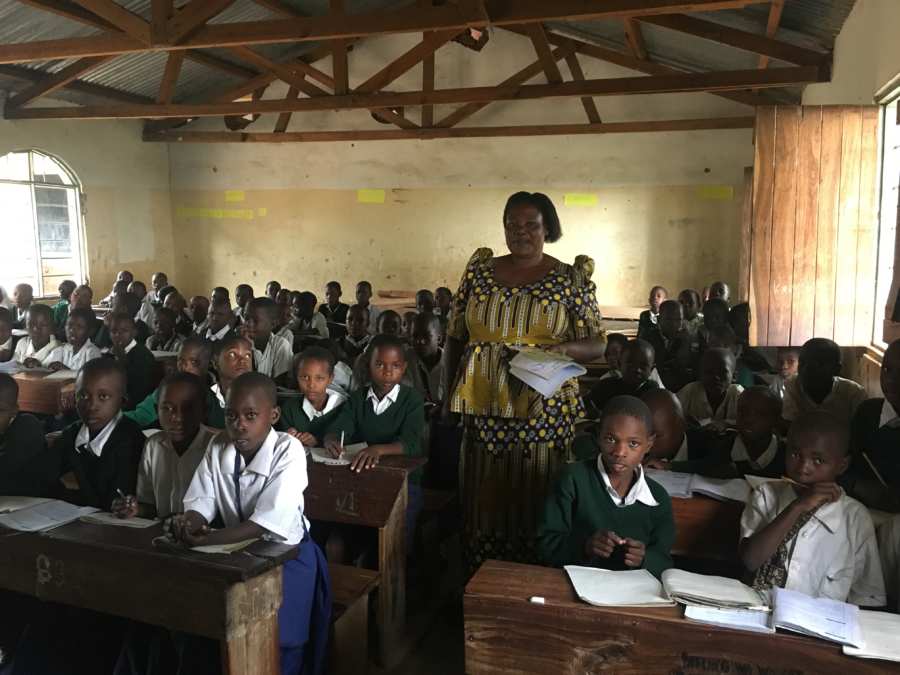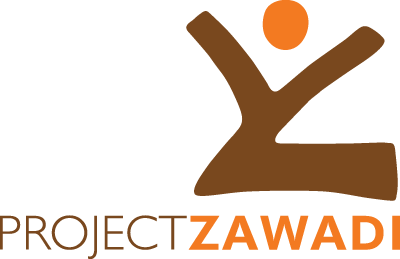Note: Linda Webster is a UK-based international education consultant that has put in countless volunteer hours with Project Zawadi compiling and creating teacher professional development materials for the Tenda Teachers program. Central to her work has been development of electronic training modules (e-modules) demonstrating active teaching and learning techniques in action in Tanzanian classrooms. The e-modules help teachers learn how to incorporate these techniques into their teaching and will be an accessible resource in areas where professional development opportunities for teachers are very limited.
We’ve all had brief encounters on trains, planes, or buses, or maybe sitting next to someone in a theatre or at the cinema. Usually a brief encounter is just that. You chat and you may even enjoy the other person’s company, but once you part, you never see them again.
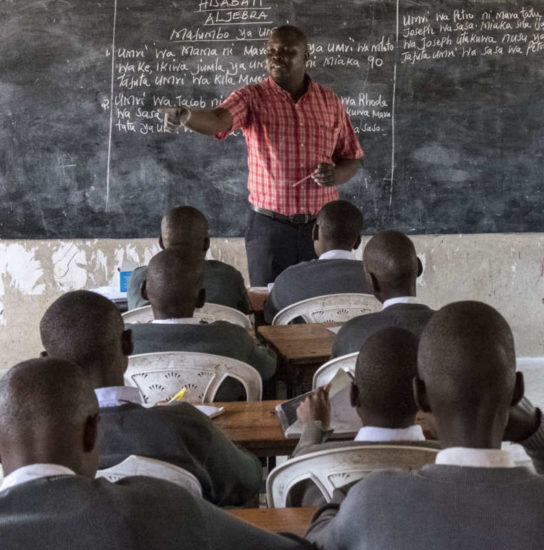
Secondary school teaching using the ‘cold calling’ technique from the e-modules.
The Role of the Federal Government in US Betting Regulation
As sports betting continues to gain popularity across the United States, the role of the federal government in regulating this industry has become a topic of significant debate and discussion. With the repeal of the Professional and Amateur Sports Protection Act (PASPA) in 2018, individual states were empowered to legalize and regulate sports betting within their borders, leading to a patchwork of regulations and oversight. However, the question remains: what should be the extent of the federal government’s involvement in standardizing and overseeing betting practices nationwide?
In this article, we delve into the complexities surrounding the role of the federal government in US betting regulation. From examining the potential benefits of a unified federal framework to exploring the challenges of balancing state autonomy with national oversight, we aim to provide a comprehensive analysis of this critical issue. Join us as we navigate the intricacies of betting regulation in the US and consider the implications of different approaches for the industry, consumers, and the broader regulatory landscape.
Historical Evolution of Federal Oversight in Betting Regulation
In the United States, the federal government plays a crucial role in regulating the betting industry. The government oversees the legality and compliance of betting activities to ensure fair practices and protect consumers. This includes monitoring and enforcing laws such as the Federal Wire Act and the Unlawful Internet Gambling Enforcement Act, which have a significant impact on the operation of betting platforms like Betzonic.
Moreover, the federal government also collaborates with state authorities to create a cohesive regulatory framework for betting. While states have the autonomy to determine their specific regulations, the federal government sets the groundwork for a standardized approach to betting laws. This partnership between federal and state entities aims to maintain consistency and transparency in the betting industry, ultimately fostering a safe and responsible betting environment for all participants, including platforms like Betzonic.
Impact of Federal Legislation on State Betting Laws
When it comes to betting regulation in the United States, the federal government plays a crucial role in setting the overall legal framework within which individual states operate. The primary law governing gambling activities at the federal level is the Interstate Wire Act of 1961, also known as the Federal Wire Act. This law prohibits the use of wire communication facilities to transmit bets or wagers across state lines or internationally.
Additionally, the Unlawful Internet Gambling Enforcement Act of 2006 (UIGEA) is another significant federal law that impacts online betting activities. The UIGEA prohibits gambling businesses from knowingly accepting payments in connection with unlawful online bets. While it does not explicitly make online gambling illegal, it imposes regulatory requirements on financial institutions to block transactions related to online betting.
Furthermore, the Professional and Amateur Sports Protection Act of 1992 (PASPA) was a federal law that prohibited states from authorizing sports betting. However, this law was overturned by the Supreme Court in 2018, allowing individual states to legalize and regulate sports betting within their borders. This decision opened the door for states to determine their own betting regulations, leading to a significant shift in the landscape of the industry.
Overall, while the federal government sets the foundation for betting regulation in the US through key laws like the Wire Act, UIGEA, and former PASPA, the actual implementation and oversight of betting activities largely fall under the jurisdiction of individual states. This state-by-state approach allows for flexibility and customization in regulating various forms of betting, including sports betting, casino gambling, and online gaming, reflecting the diverse preferences and priorities of different regions across the country.
Challenges and Controversies Surrounding Federal Intervention
When it comes to betting regulation in the United States, the federal government plays a significant role in overseeing and enforcing laws related to gambling activities. While each state has the authority to regulate betting within its borders, certain aspects of the industry fall under federal jurisdiction. One of the key responsibilities of the federal government in this area is to ensure compliance with laws such as the Federal Wire Act, which prohibits the use of wire communication facilities to transmit bets or wagers.
Additionally, the federal government has been involved in shaping policies related to sports betting through legislation like the Professional and Amateur Sports Protection Act (PASPA). This law, passed in 1992, effectively banned sports betting in most states, with exemptions for a few that already had existing regulations in place. However, the landscape changed significantly in 2018 when the Supreme Court struck down PASPA, paving the way for individual states to legalize and regulate sports betting within their borders.
While the federal government continues to have a role in overseeing certain aspects of betting regulation, the trend in recent years has been towards greater state autonomy in this area. With the legalization of sports betting gaining momentum across the country, states are taking the lead in crafting and implementing their own regulations. This shift towards state-level control reflects a broader movement towards decentralization in the governance of gambling activities in the United States.
Future Prospects for Federal Involvement in US Betting Regulation
The role of the Federal Government in regulating betting activities in the United States is multifaceted and crucial in ensuring fair and responsible gambling practices. While gambling laws are primarily determined at the state level, the federal government plays a key role in overseeing certain aspects of betting regulation to maintain consistency and integrity across the nation.
One of the most significant federal laws impacting the betting industry is the Professional and Amateur Sports Protection Act (PASPA) of 1992, which prohibited states from legalizing sports betting. However, this law was overturned by the Supreme Court in 2018, allowing individual states to legalize and regulate sports betting within their borders. The federal government continues to monitor this evolving landscape to ensure compliance with federal guidelines.
Additionally, the Federal Wire Act of 1961 prohibits the use of wire communications for interstate sports betting. This law aims to prevent organized crime and illegal gambling activities from proliferating across state lines. The Department of Justice plays a crucial role in enforcing the Wire Act and investigating any violations that may occur.
Overall, the federal government serves as a guiding force in shaping the regulatory framework for betting activities in the US. While states have the authority to enact their own laws regarding gambling, federal oversight helps maintain consistency, integrity, and adherence to core principles of fairness and consumer protection in the rapidly expanding betting industry.
As the landscape of betting regulation in the US continues to evolve, the role of the federal government remains a crucial aspect of ensuring consistency and fairness across states. While states have traditionally held the power to regulate gambling within their borders, the need for federal oversight to address issues such as sports integrity and consumer protection is increasingly apparent. By striking a balance between state autonomy and federal intervention, policymakers can create a framework that promotes responsible gambling practices while also fostering innovation and growth in the industry. As discussions around federal involvement in betting regulation persist, it is clear that collaboration and cooperation between federal and state entities will be essential in shaping a regulatory environment that benefits both operators and consumers alike.
My brief encounter with Brian was something quite different, however. Brian is the Executive Director of Project Zawadi (PZ). We met on a plane in Tanzania and chatted for 20 minutes. Somewhere in that chat, he happened to mention Project Zawadi and the e-modules they were creating. I happened to mention that, as an international Education Consultant and lover of Africa, I’d be very interested in contributing. Little did I realise the impact that encounter would have.
Fast forward a few weeks and I was on the team, writing e-modules and accompanying materials. Within a few months of that, I found myself back in Tanzania in the Mara region, armed with some of these materials and ready to try them out.
I visited various schools to observe teachers and students and identify which teaching methods would likely have the most impact on learning. Along with Project Zawadi Directors Adrian and Judith, we met with both teachers and parents and tried out the materials. It was an incredible learning experience for me and I found myself both in awe of the students, who are so obviously keen to learn, and humbled by teachers, who are teaching classes of 100+ students in basic classrooms with minimal resources.
We tried out the first e-module at Sarawe Primary School. We had to decamp from the school to one of the teachers’ houses because that was the only place large enough for a group of teachers that also had electricity. The teachers seemed to enjoy the e-module – and they certainly took lots of notes! We left feeling optimistic that this approach just might work. And when I returned a few months later, I was able to observe the teachers still using these strategies with their students.
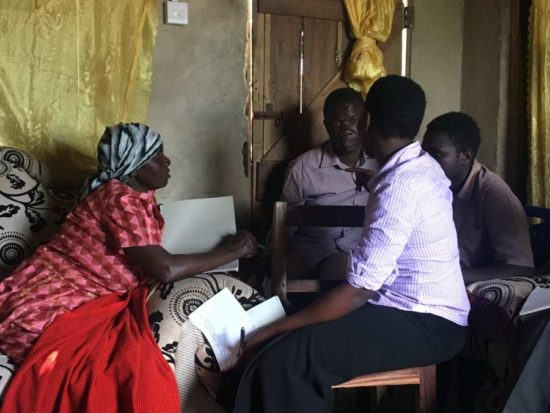
Teachers and PZ staff discuss the potential of the e-modules.
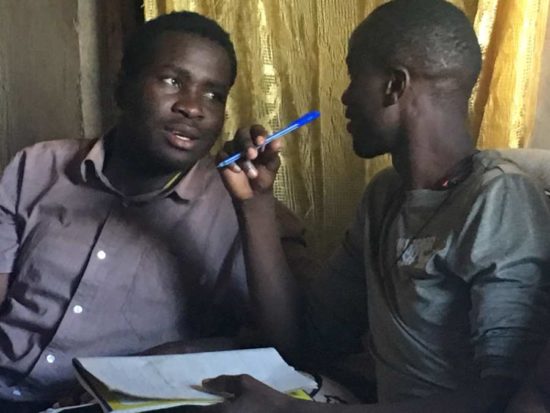
Teachers discussing the new techniques.
Soon all the e-modules had been written, discussed, rewritten, and polished until they shone. All that was needed were videos of teachers in action using them in their classrooms. So capturing that was my task during my third visit to the region.
Two local young men, Hashbi and Mickdaddy, filmed and edited the videos and PZ Special Projects Manager, Maneno Wright, was invaluable – in fact, we couldn’t have done it without him. A group of five local teachers had received some additional training from PZ Board Member Ian Keith earlier in the year to prepare them for the videos. It was inspiring to see the changes in their teaching. They reported that students were more attentive in class, that attendance had improved, and one teacher even said that exam results had improved. They also told me that they knew their students better and were therefore able to teach them better. I couldn’t have asked for better testimonials if I’d written them myself.
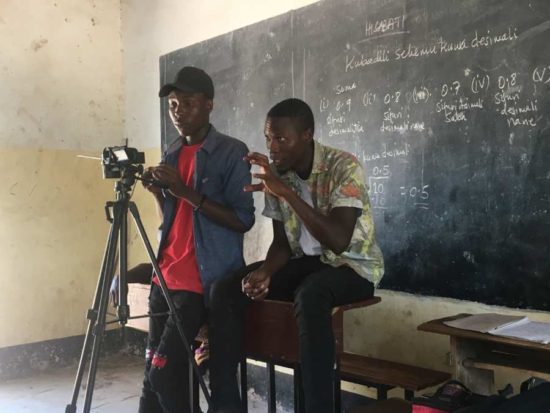
Videotaping of lessons in Tanzanian classrooms was an important part of the e-modules.
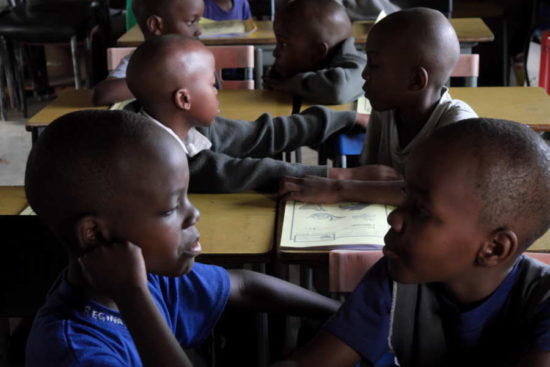
Students practicing the “turn and talk” technique demonstrated on the e-module.
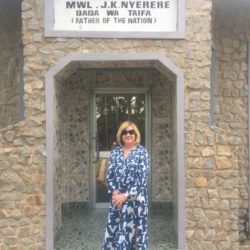
Linda Webster visiting President Julius Nyerere’s birthplace.
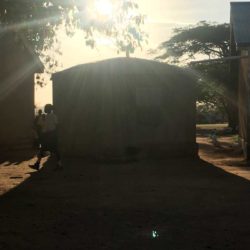
Sunrise over a traditional home.
While most of my time is spent working when I’m there, there are also opportunities to enjoy some of the local culture. For example, the National Flame (the Uhuru Torch which is a national symbol of freedom and travels throughout the country) came to nearby Bunda. I was able to see it along with the carnival atmosphere surrounding it. Adrian has taken me to various restaurants and also opened up his home to me. I was able to go to Butiama and explore the birthplace and museums devoted to Julius Nyerere, the first president of Tanzania. Even simply wandering around Bunda with my camera (I’m a serious photographer) was fascinating. And there is some wonderful scenery between where I stayed in Bunda and the schools where we worked. The best part of this experience, however, has been working with the Project Zawadi staff, volunteers, local teachers, and our video team. I’ve learned so much from each and every one of them and also enjoyed their company.
Finally, I’ve loved being among the children, seeing their smiles and hearing their laughter and watching them strain to absorb every bit of knowledge they can. To see how they value their education is truly inspiring. I feel incredibly fortunate to be a part of this.
